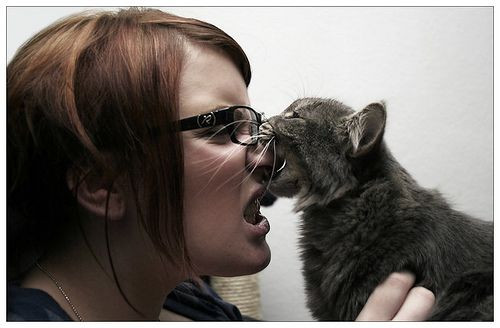Why Are Cat Bites Linked To Depression? 2 Logical Theories And A (Somewhat) Outrageous One

Let’s clear one thing up: Not all cat ladies are crazy. Some aren’t even ladies — consider all the men who hermetically seal themselves indoors, with nothing but the symphony of beckoning purrs and meows to keep them company. From time to time, these cats bite. And if a recent University of Michigan study is anything to go on, the more they bite, the more depressed their owners are.
Stereotypically speaking, cat ownership acts a faithful predictor of mental instability. We tend to assume that the more cats a person owns, the less stable she is. (Yes, both sexes own cats, but this topic all but begs to be stereotyped). Now science has quantified this previously held assumption, finding over the course of a 10-year study, involving 1.3 million people, that the more someone gets bitten by a cat, the more likely she is to have suffered from a depressive episode.
There are three theories to explain this relationship, the researchers argue. Two of them are entirely reasonable, while the third is less probable (though still the most exciting of the three, not that that necessarily counts for anything.)
Theory #1
Depressed people are more likely to own cats in the first place, making them more likely to get bitten by one.
This theory is perhaps the most intuitive of the three, which makes it the most boring. People who lack companionship, be they family or friends, routinely fill the void with the unconditional love of a pet. Cats, with their eternal aloofness, aren’t exactly the cuddliest of animals, but own enough of them and your odds of matching in the aggregate the affection of say, a dog, are good. They also don’t need to be walked, making them ideal for the sunlight-averse individual who’s perfectly happy changing the occasional litter box.
“There is substantial evidence to suggest that pet ownership results in multiple health benefits, both physical and mental,” the researchers wrote. “For example, pet ownership has been shown to reduce elevated blood pressure caused by mental stress even better than antihypertensive medications.”
Unfortunately, yet quite understandably, it just so happens these cats bite from time to time.
Theory #2
Cats can sense depression in their owners’ negative body language, so out of lack of affection they bite them.
This theory is far more interesting, which has the unfortunate byproduct of seeming less true. But researchers claim it’s just as likely as the first theory. “Some animals may bite more in response to changes in their owners' mental state or level of responsiveness,” they note. “For example, depressed individuals often make less eye contact compared to those without depression.”
While typically indifferent to what their owners are up to, cats are often lumped into a more familiar collection of animals, such as dogs, horses, and pigs, which have particularly keen abilities at reading human emotions. Like other pets, cats respond attentively to a pointed finger or well-focused gaze. One study, the researchers highlight, found that cats changed their behavior significantly depending on the test subject’s own movements.
Theory #3
Cat bites cause depression because the animals carry a parasite that forces the host to become suicidal and violent.
Here’s a case where science-fiction has its roots more in the science half than in fiction. One of the most common human parasites, Toxoplasma gondii, is capable of infecting nearly all warm-blooded animals. The terrifying part? Cats are the only animals capable of hosting the parasite; all other infected animals serve as the intermediate host, while T. gondii reproduces exclusively within felines.
In actuality, depression may be the least of your worries if a cat with T. gondii bites you, as it’s also been associated with schizophrenia, obsessive compulsive disorder, and other brain pathologies. As the researchers concede, however, bites aren’t the parasite’s primary mode of transmission. “Rather, the parasite is typically shed in the feces of cats,” they explain. “Most transmission occurs orally through contact with contaminated food or drink, or in utero from mother to fetus. This is why pregnant women are advised not to change a cat’s litter box.”
Conclusions?
Cat bites and depression are inextricably linked according to the team’s data. Out of their million-plus data points, more than 41 percent admitted to the hospital for cat bites had also received treatment for depression at some point in their lives. And further galvanizing the stereotype, 86 percent of the people that had been both bitten and diagnosed with depression were women. Together with the rest of their data, they found that if you are a woman who’s been bitten by a cat, there’s a 50 percent chance you will be diagnosed, at some point in your life, with depression.
Now I ask you: Is betting your mental health on the flip of a coin, all for a begrudging nuzzle, really worth it?
Source: Hanauer D, Ramakrishnan N, Seyfried L. Describing the Relationship between Cat Bites and Human Depression Using Data from an Electronic Health Record. PLoS ONE. 2014.
Published by Medicaldaily.com



























